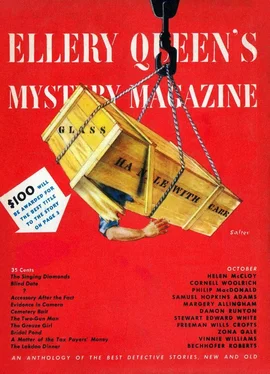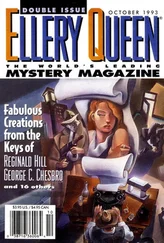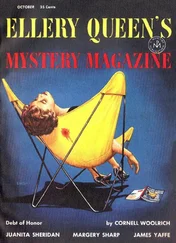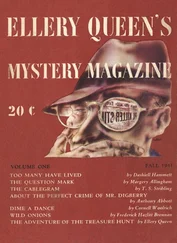Марджери Аллингем - Ellery Queen’s Mystery Magazine. Vol. 14, No. 71, October 1949
Здесь есть возможность читать онлайн «Марджери Аллингем - Ellery Queen’s Mystery Magazine. Vol. 14, No. 71, October 1949» весь текст электронной книги совершенно бесплатно (целиком полную версию без сокращений). В некоторых случаях можно слушать аудио, скачать через торрент в формате fb2 и присутствует краткое содержание. Город: New York, Год выпуска: 1949, Издательство: The American Mercury, Жанр: Классический детектив, на английском языке. Описание произведения, (предисловие) а так же отзывы посетителей доступны на портале библиотеки ЛибКат.
- Название:Ellery Queen’s Mystery Magazine. Vol. 14, No. 71, October 1949
- Автор:
- Издательство:The American Mercury
- Жанр:
- Год:1949
- Город:New York
- ISBN:нет данных
- Рейтинг книги:5 / 5. Голосов: 1
-
Избранное:Добавить в избранное
- Отзывы:
-
Ваша оценка:
- 100
- 1
- 2
- 3
- 4
- 5
Ellery Queen’s Mystery Magazine. Vol. 14, No. 71, October 1949: краткое содержание, описание и аннотация
Предлагаем к чтению аннотацию, описание, краткое содержание или предисловие (зависит от того, что написал сам автор книги «Ellery Queen’s Mystery Magazine. Vol. 14, No. 71, October 1949»). Если вы не нашли необходимую информацию о книге — напишите в комментариях, мы постараемся отыскать её.
Ellery Queen’s Mystery Magazine. Vol. 14, No. 71, October 1949 — читать онлайн бесплатно полную книгу (весь текст) целиком
Ниже представлен текст книги, разбитый по страницам. Система сохранения места последней прочитанной страницы, позволяет с удобством читать онлайн бесплатно книгу «Ellery Queen’s Mystery Magazine. Vol. 14, No. 71, October 1949», без необходимости каждый раз заново искать на чём Вы остановились. Поставьте закладку, и сможете в любой момент перейти на страницу, на которой закончили чтение.
Интервал:
Закладка:
I turned away and would have passed on down the street, when I noticed that there was a second frontage to the building. I put my head in the first door I came to and saw Chippy’s back. He was leaning on the bar, which was small and temporarily unattended, the landlord having moved farther along it to the adjoining room. At first I thought he was alone, but on coming into the room I saw his smiling friend reclining on a narrow bench which ran along the inner wall. He was still beaming, but the vacancy of his broad face was intensified, if one can say such a thing, and I knew he must have ceased long ago to hear anything Chippy was telling him. Chippy was talking. He always talks when he’s drunk, not wanderingly nor thickly but with a low intensity some people find unnerving. He was in full flight now. Soft incisive words illustrated by the sharp gestures of one hand — the other, after all, was supporting him — flowed from him in a steady forceful stream.
“Trapped,” he whispered to his friend’s oblivion. “Trapped for life by a woman with a sniff and a soul so mean — so mean — so MEAN ...” He turned and looked at me. “Hullo,” he said.
I remember I had some idea that in that condition of his I could fool him that I’d either been there all the time or was not there at all — I forget which.
The barman bustled back, drew me a beer and waddled off again, after nodding to Chippy in a secret important way I entirely misunderstood.
“She was mean, was she?” I ventured, mumbling into my beer.
“As the devil,” Chippy agreed and his red eyes wandered up to look over my shoulder. “Come in, son,” he said softly.
A pallid youth was hesitating in the doorway and he came forward at once, a long cardboard roll held out before him like a weapon.
“Dad said you was to have these and he’d see you tomorrow.”
As soon as the kid had gone, Chippy tore the paper off the roll and I could see it consisted of four or five huge blown-up prints, but he did not open them out.
The smiling man on the bench moved but did not rise. His eyes were tightly shut but he continued to grin. Chippy looked at him for some time before he suddenly turned to me.
“He’s canned,” he said. “Canned as a toot. I’ve been carting him round the whole week to have someone safe to talk to, and now look at him. Never mind. Listen to me. Got imagination?”
“Yes,” I assured him flatly.
“You’ll need it,” he said. “Listen. He was young, a simple ordinary friendly kid like you or I were, and he came to the seaside on his holiday. Only one week’s holiday in the year.” He paused for the horror to sink in. “One week, and she caught him.”
“His wife caught him, you say?”
“No.” He lowered his voice to the intense stage-whisper again. “Her mother. The landlady. She worked it. Twisted him.” He made a peculiar bending movement with his two hands. “You know, said things. Made suggestions. Forced it. He had to marry the girl. Then he had hell. Couldn’t afford it. Got nagged night and day, day and night.”
He leaned towards me and I was aware of every one of his squat uneven teeth.
“He grew old,” he said. “He lost his job. Got another, buying old gold. Used to go round buying old gold for a little firm in the Ditch. It went on for years and years. Years and years. And more years. A long time. Then it happened. He began to see her.”
“Who?” I demanded. “His wife?”
“No, no.” Chippy was irritated. “She’d left him, taken all he had, sold the furniture, and scampered with another poor mug. That was years ago. No, he began to see the mother.”
“Good God,” I said, “and she was red-haired, I suppose?”
“Imagination,” he whispered at me. “Use it. Think. He married the girl in 1912, but this year he began to see the mother as she used to be!
“He’s been traveling round the coast for years, buying old gold. Everybody knows him and nobody notices him. Millions of women recognize him when he taps at their doors and very often they sell him little things. But he was ill last winter, had pleurisy, had to go into a hospital. Since he’s been out he’s been different. The past has come back to him. He’s been remembering the tragedy of his life.” He wiped his mouth and started again.
“In May he saw her. At first she looked like a woman he knew called Wild, but as they were talking her face changed and he recognized her. He knew just what to do. He told her he’d had a bargain he didn’t feel like passing on to his firm. Said he’d got a ring cheap, and if she’d meet him he’d show it to her and maybe sell it to her for the same money he paid for it.”
“And when he got her alone he killed her?” I whispered.
“Yes.” Chippy’s voice held an echoed satisfaction. “Paid her out at last. He went off happy as an old king and felt freed and contented and satisfied until June, when he went to Turnhill Bay and knocked all unsuspecting at a door in a back street and — saw her again.”
It was at this precise moment that the smiling drunk on the bench opened his eyes and sat straight up abruptly, as drunks do, and then with a spurt set out at a shambling trot for the door. He hit the opening with a couple of inches to spare and was sucked up by the night. I yelled at Chippy and started after him, pausing on the threshold to glance back. Chippy leaned there against the bar, looking at me with fishlike unintelligence.
I looked over my shoulder and saw Chief Inspector Tizer and the local Super, together with a couple of satellites, slip quietly across the road and come into the bar.
Then Chippy stood at the bar with Tizer on one side of him and the local man on the other. The five blown-up prints were spread out on the wood and everyone was so engrossed in them that I came back.
They were five three-quarter length portraits of the same man. Each one had been taken out of doors in a gaping crowd, and on each print a mid-section was heavily circled with process-white. In every case, within the circle was a watch-chain hung with darts medals and other small decorations, which might easily have been overlooked had not attention thus been called to them. In the first portrait the watch-chain carried two medals and a cheap silver earring In the second, a gold clasp from a chain-bracelet had been added. In the third, a small locket. In the fourth, a silver button with a crest on it. And in the fifth there hung beside the rest an ugly little tassel from an old-fashioned brooch.
“You’re trying to tell me you only noticed this yesterday and you had the astounding luck to find the earlier photographs in your file?” Tizer said.
“I am lucky,” Chippy said, “and observant.” He glanced at the bartender. “Ready, George?”
“Yes, he’s still there, Mr. Wager.”
The police moved forward in a body. Chippy turned to me.
“Poor little blob,” he said. “He’s quite happy now, you see, till the next new moon.”
“When you will be otherwise engaged, I seem to remember,” I said.
He glanced at me with a sudden smile and adjusted his camera.
“That’s right,” he said. “There’s sympathy in this business, but no sentiment. Wait just a minute while I get the arrest.”
Интервал:
Закладка:
Похожие книги на «Ellery Queen’s Mystery Magazine. Vol. 14, No. 71, October 1949»
Представляем Вашему вниманию похожие книги на «Ellery Queen’s Mystery Magazine. Vol. 14, No. 71, October 1949» списком для выбора. Мы отобрали схожую по названию и смыслу литературу в надежде предоставить читателям больше вариантов отыскать новые, интересные, ещё непрочитанные произведения.
Обсуждение, отзывы о книге «Ellery Queen’s Mystery Magazine. Vol. 14, No. 71, October 1949» и просто собственные мнения читателей. Оставьте ваши комментарии, напишите, что Вы думаете о произведении, его смысле или главных героях. Укажите что конкретно понравилось, а что нет, и почему Вы так считаете.












